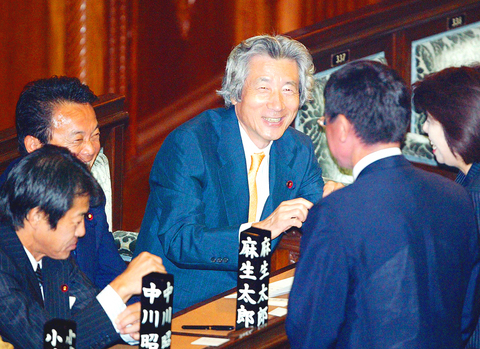Japan's parliament yesterday started a session dedicated to breaking up the massive post office after the landslide election victory of Prime Minister Junichiro Koizumi, whose popularity keeps on rising.
Parliament re-elected the reform-minded populist as premier along party lines as it began its 42-day special session.
"As we saw the election results, our house decided to appoint Mr. Junichiro Koizumi as prime minister," Speaker Yohei Kono told the lower house as Koizumi stood up and bowed several times to newly elected lawmakers.

PHOTO: EPA
Koizumi has said he will keep all of his current Cabinet members during the special session, but a reshuffle is expected after parliament finishes the session on Nov. 1.
Koizumi, 63, has been in office since April 2001, making him the longest-serving Japanese premier in two decades.
He can serve until the lower house is again dissolved, but he has repeatedly said he will step down next September when his term ends as head of the ruling Liberal Democratic Party, rejecting calls to stay longer and seize on his mandate.
The parliamentary session follows a historic victory by Koizumi, who captured a more than two-thirds majority in the Sept. 11 election.
Koizumi called the early lower house election after the previous legislature defeated bills to privatize the post office, a cherished plan for which he has campaigned for decades.
Dissidents within the ruling party had worked to protect the current post office, which is effectively the world's biggest financial institution with US$3 trillion in savings and insurance assets.
The postal bills had been approved before the election by the lower house but were rejected in the upper house, where the government enjoys a slimmer margin and which cannot be dissolved for snap polls.
Koizumi's two-thirds majority means the lower house can now override the upper house, where some dissidents have said they have changed their mind and will back postal reform.
The premier cast postal privatization as a litmus test for reform during the election campaign, in which he enlisted celebrity candidates to defeat rivals purged from the ruling party.
The main opposition Democratic Party of Japan, which was crushed in the election, is set to file an alternative plan to privatize the post office.
The opposition party on Saturday elected as its new president Seiji Maehara, a 43-year-old security expert.
The snap election was a gamble. Many in Koizumi's party warned that voters cared little about his plan to privatize the post office, which the premier contends will revitalize the economy and clean up public finances.
But Koizumi is now basking in political success with massive public support for his determination.
In a survey published yesterday by the Yomiuri Shimbun, the Koizumi Cabinet's approval rating soared to 62.0 percent, up 14.3 points from last month's poll.

POLITICAL PRISONERS VS DEPORTEES: Venezuela’s prosecutor’s office slammed the call by El Salvador’s leader, accusing him of crimes against humanity Salvadoran President Nayib Bukele on Sunday proposed carrying out a prisoner swap with Venezuela, suggesting he would exchange Venezuelan deportees from the US his government has kept imprisoned for what he called “political prisoners” in Venezuela. In a post on X, directed at Venezuelan President Nicolas Maduro, Bukele listed off a number of family members of high-level opposition figures in Venezuela, journalists and activists detained during the South American government’s electoral crackdown last year. “The only reason they are imprisoned is for having opposed you and your electoral fraud,” he wrote to Maduro. “However, I want to propose a humanitarian agreement that

ECONOMIC WORRIES: The ruling PAP faces voters amid concerns that the city-state faces the possibility of a recession and job losses amid Washington’s tariffs Singapore yesterday finalized contestants for its general election on Saturday next week, with the ruling People’s Action Party (PAP) fielding 32 new candidates in the biggest refresh of the party that has ruled the city-state since independence in 1965. The move follows a pledge by Singaporean Prime Minister Lawrence Wong (黃循財), who took office last year and assumed the PAP leadership, to “bring in new blood, new ideas and new energy” to steer the country of 6 million people. His latest shake-up beats that of predecessors Lee Hsien Loong (李顯龍) and Goh Chok Tong (吳作棟), who replaced 24 and 11 politicians respectively

Archeologists in Peru on Thursday said they found the 5,000-year-old remains of a noblewoman at the sacred city of Caral, revealing the important role played by women in the oldest center of civilization in the Americas. “What has been discovered corresponds to a woman who apparently had elevated status, an elite woman,” archeologist David Palomino said. The mummy was found in Aspero, a sacred site within the city of Caral that was a garbage dump for more than 30 years until becoming an archeological site in the 1990s. Palomino said the carefully preserved remains, dating to 3,000BC, contained skin, part of the

Russian hackers last year targeted a Dutch public facility in the first such an attack on the lowlands country’s infrastructure, its military intelligence services said on Monday. The Netherlands remained an “interesting target country” for Moscow due to its ongoing support for Ukraine, its Hague-based international organizations, high-tech industries and harbors such as Rotterdam, the Dutch Military Intelligence and Security Service (MIVD) said in its yearly report. Last year, the MIVD “saw a Russian hacker group carry out a cyberattack against the digital control system of a public facility in the Netherlands,” MIVD Director Vice Admiral Peter Reesink said in the 52-page